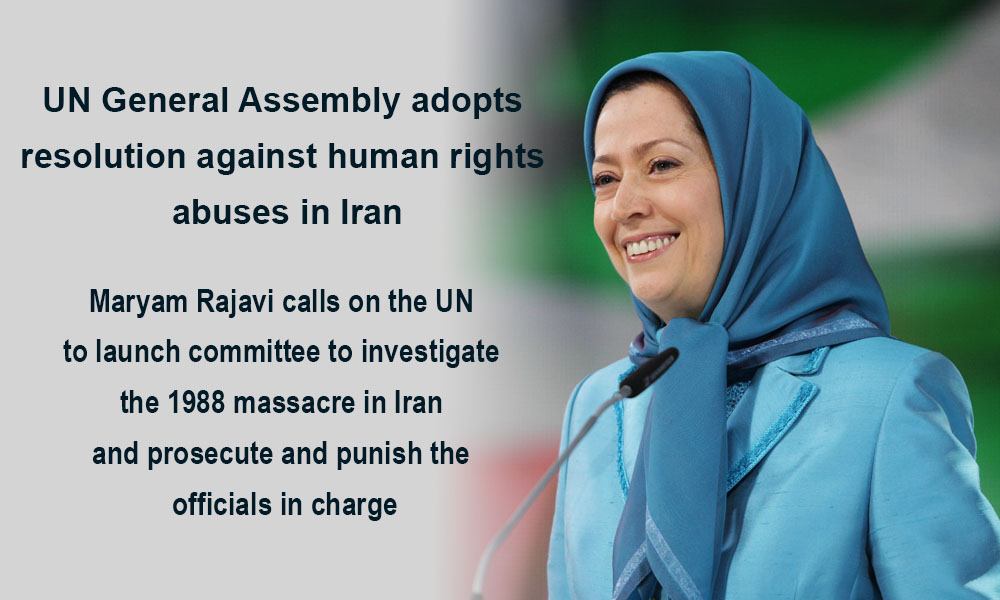UN General Assembly adopts resolution against human rights abuses in Iran

The United Nations General Assembly adopted its 64th resolution on Tuesday, December 19, against violations of human right in Iran.
Maryam Rajaviwelcomed the resolution and said, “In the case of a regime which has totally ignored dozens of UN resolutions against the unabated violations of human rights in Iran and its highest officials publicly boast of massacring political prisoners, the international community must adopt binding measures to stop the regime’s crimes. All diplomatic and commercial relations with the mullahs’ theocratic regime directly serve the interests of Khamenei’s Revolutionary Guard Corps (IRGC), and must be conditioned on an end to torture and executions in Iran and a halt to the regime’s destructive meddling in the region. In the absence of a firm policy, flagrant violations of human rights in Iran and export of terrorism, fundamentalism and belligerence to the region and the world will continue.”
Referring to the resolution’s call on the Iranian regime “to launch a comprehensive accountability process in response to all cases of serious human rights violations, including those involving the Iranian judiciary and security agencies, and… to end impunity for such violations,” Mrs. Rajavi stressed, “The most significant example of serious human rights violations in Iran is the massacre of political prisoners in 1988 in which all the clerical regime’s officials specifically Ali Khamenei as well as the mullahs’ judiciary and the highest officials in charge of security and intelligence agencies were involved and complicit. They defend it but have so far remained immune from prosecution. Therefore, the international community faces a great test in investigating this great crime against humanity and prosecuting its perpetrators.”
Maryam Rajavi urged the UN to launch an investigative committee in this case, adding, “This is the first step in putting an end to the impunity of criminals who have been ruling Iran for 38 years.”
The UN General Assembly expressed “serious concern at the alarmingly high frequency of the imposition and carrying-out of the death penalty… including the imposition of the death penalty against minors and persons who at the time of their offence were under the age of 18, and executions undertaken for crimes that do not qualify as the most serious crimes, on the basis of forced confessions” and called on the Iranian regime “to abolish, in law and in practice, public executions.”
The UN General Assembly resolution also called on the Iranian regime to cease and end “torture or other cruel, inhuman or degrading treatment or punishment”, “widespread and systematic use of arbitrary detention, including the use of such practices to target dual and foreign nationals”, “the poor conditions of prisons”, “denial of access to adequate medical treatment”, “widespread and serious restrictions… on the right to freedom of expression, opinion, association and peaceful assembly, both online and offline”, “the harassment, intimidation and persecution of political opponents, human rights defenders, women’s and minority rights activists, labour leaders, students’ rights activists, academics, film-makers, journalists, bloggers, social media users and social media page administrators, media workers, religious leaders, artists, lawyers and persons belonging to recognized and unrecognized religious minorities and their families”, “unduly harsh sentences, including the death penalty and long-term internal exile”, “reprisals against individuals, including for cooperating with the United Nations human rights mechanisms,” and “all forms of discrimination and other human rights violations against women and girls” and “against persons belonging to religious, ethnic, linguistic or other minorities.”
The Secretariat of the National Council of Resistance of Iran
December 19, 2017

